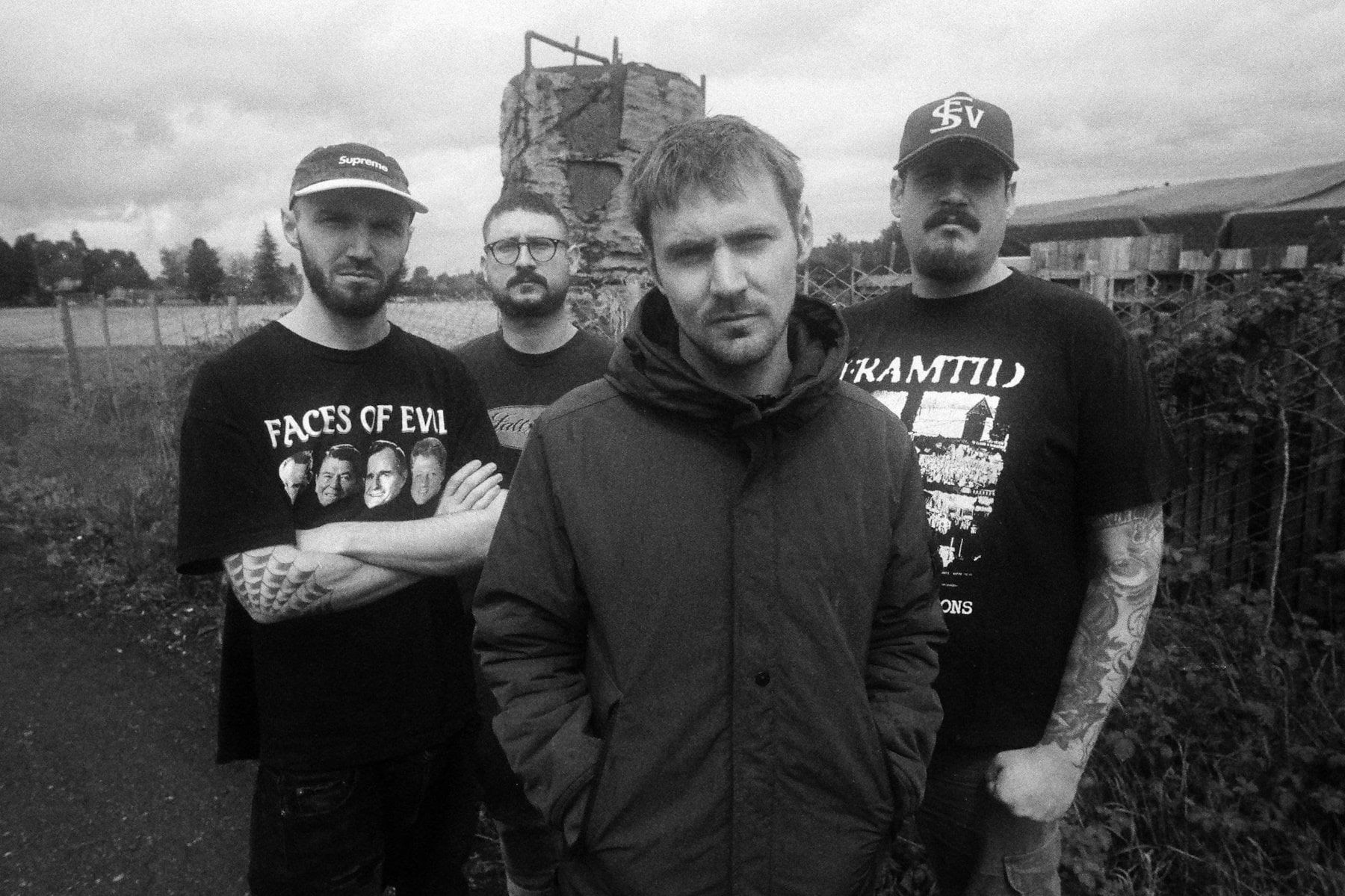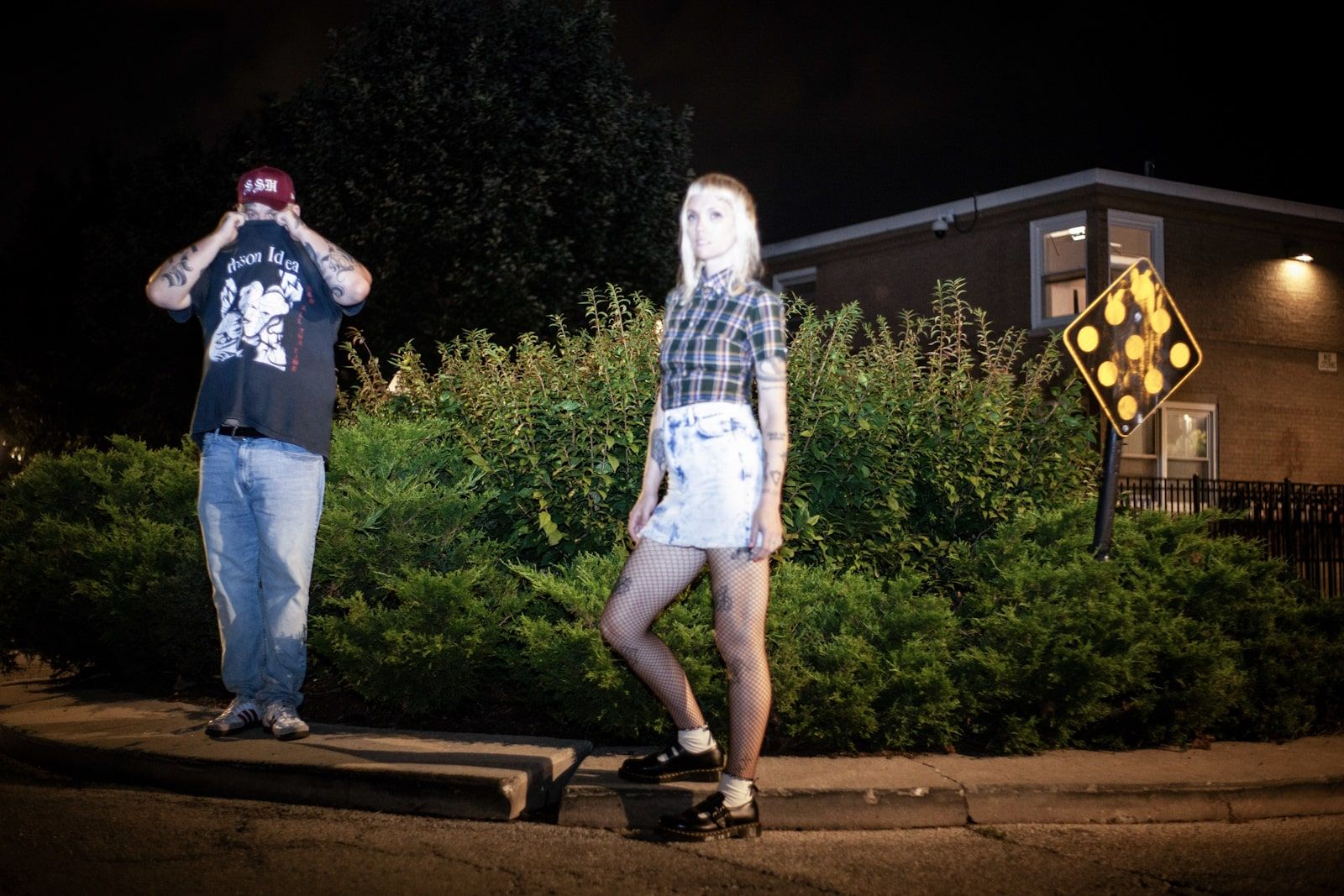Regional Justice Center recently announced their return along with their third album, Freedom, Sweet Freedom, due out September 20th via Closed Casket Activities. Today the most compelling band in hardcore are sharing another ferocious new single, “Moral Death Sentence.”
Regional Justice Center has always been about two brothers. Ian Shelton started the project in 2016 shortly after the incarceration of his younger sibling Max, and each release has not only sought to explore the choices, cycles, experiences, and institutions surrounding that event, but also to keep the two tethered during Max’s time in prison (learn more through our interview here).
In 2022 Max was released and now Freedom, Sweet Freedom, brings him directly into the fold, writing and performing on the album. And Max isn’t the only impactful lineup addition–the album was recorded by acclaimed engineer Taylor Young who has now also joined RJC as a member. The result is not only a record that’s packed with years-in-the-making emotional catharsis, it’s also the most sonically hard-hitting 13 minutes of aggressive music you’ll hear this year.
“Moral Death Sentence” follows earlier singles “Freedom” and “Take a Step Away” (which drew attention from the likes of Pitchfork, Stereogum, BrooklynVegan, Revolver Magazine, and more), a offers another taste Freedom Sweet Freedom’s truly crushing sound.
Freedom, Sweet Freedom follows 2021’s Crime and Punishment, an album that drew praise from the likes of The FADER, Stereogum, BrooklynVegan, Revolver Magazine, Decibel Magazine, Consequence, and many more, and very well may be the first proper powerviolence album to ever crack a Billboard chart. Shortly after its release, RJC went dormant while Ian focused on his quickly growing other band, Militarie Gun. Fast forward several years and the now reunited Shelton brothers have finally be able to come together to great what Ian calls “THE Regional Justice Center album.”
Freedom, Sweet Freedom is the kind of album that exemplifies everything that makes hardcore such a deeply intense and impactful genre: a lightning fast blast of extreme music that’s loaded with raw emotion and thorny ideas. “The album is saying that despite the trappings of freedom, you are not actually free,” Ian explains. “We’re all subject to a larger, broader system that’s meant to keep us in specific cycles–I think that’s a lot of what RJC has always been talking about: cycles of abuse, addiction, making the same mistakes over and over. There’s no freedom from society, from the system, or even from yourself.”
Regional Justice Center has never been just a band.
It’s a lifeline, a vital means of expression and catharsis, a way to try and unpack profoundly life-altering circumstances, and most importantly, a very real connection between two brothers. Ian Shelton started the project in 2016 shortly after the incarceration of his younger sibling Max, and each release has not only sought to explore the choices, cycles, experiences, and institutions surrounding that event, but also to keep the two tethered during Max’s time in prison. Regional Justice Center’s third full-length, Freedom, Sweet Freedom, brings Max directly into the fold following his 2022 release, and finds the brothers trying to reckon with everything that’s happened, and whether or not true closure is even possible.
Freedom, Sweet Freedom is the final chapter in a trilogy that started with RJC’s 2018 debut album, World of Inconvenience, which explored life interrupted by being held accountable for one’s actions. Throughout the album Ian wove in phone conversations with Max recorded from the inmate calling service–a stark reminder to the listener that there’s a very real person at the heart of the bigger ideas. 2021’s sophomore effort Crime and Punishment went back further, delving into the brothers’ upbringing and family life, and taking an unvarnished look at how difficult it can be to counteract cycles of hurt and addiction once they’ve started.
Throughout the band’s catalog, Ian’s writing has been defined less by its unflinching look at challenging topics, and more by its nuance and empathy. The songs are uncompromising in their subject matter, but non-judgemental in their execution, with Max’s presence–or lack thereof–weighing heavily on Ian’s mind and lyrics. “It always felt really special to have Ian make me a part of this thing,” explains Max. “We’d have phone calls and things I said would end up on a record, and we’d always talk about me being more involved when I got out. It felt like being a long distance member of the band. But also music wasn’t super accessible when I was inside, so it wasn’t until I got out that I really started to get a sense of everything RJC had done and how much it had grown and connected with people. It’s kind of crazy to be part of the concept that’s now built into such a cool thing.”
With Freedom, Sweet Freedom, Max is much more than that–he’s finally able to lend his own voice to the band he inspired. “He’s always been part of it, but now he’s actually here and able to directly participate,” says Ian. “We knew that if we were going to make a record together it had to be a real statement, it had to be THE Regional Justice Center album.” To do that, the band needed two elements, the first being time. “RJC is sort of like Godzilla,” Ian laughs. “It disappears until the moment is right to reemerge. It has to be completely intuitive, it can’t be forced, and I think that if Max had tried to make this record when he was fresh out, his perspective would have just been so different.”
Max agrees, adding, “I was just extremely confused and overwhelmed most days when I first got out. It’s been almost two years now and I’ve been able to reflect back on everything in more of a healthy way. I think making music has given me a sense of normalcy too, it’s helped me actually understand my emotions more.”
The second essential element to making Freedom, Sweet Freedom was Taylor Young. The highly in-demand producer and engineer (and member of Twitching Tongues, God’s Hate, and Dead Body) recorded Crime and Punishment and Ian recruited him once again for Freedom, Sweet Freedom–only this time Young inadvertently became an official RJC member during the process.
“When we started the record, we didn’t know Taylor was joining the band,” Ian explains. “It was just our usual way of working, but then he started bringing song ideas and they began to feel really RJC. He also just has a very big role in Max and I’s lives, so it felt like a natural thing for him to be in the band.”
The result is the most collaborative and crushing RJC record to date, with music split between Ian, Young, and guitarist Alex Haller, and lyrics split between the Shelton brothers. It’s the kind of album that exemplifies everything that makes hardcore such a deeply intense and impactful genre: a pummeling, 13-minute blast of extreme music that’s loaded with raw emotion and thorny ideas.
“The album is saying that despite the trappings of freedom, you are not actually free,” says Ian. “We’re all subject to a larger, broader system that’s meant to keep us in specific cycles–I think that’s a lot of what RJC has always been talking about: cycles of abuse, addiction, making the same mistakes over and over. There’s no freedom from society, from the system, or even from yourself.”
RJC has always been about more than music, but the project wouldn’t be so effective and affecting if the songs weren’t worthy of their subject matter.
Opening track “Freedom” proves that the band are more than up to that challenge, with Max’s throat-shredding bellow of the song title giving way to a minute of blistering riffs and disorientingly heavy rhythms. Ian’s lyrics set up many of the album’s themes before Max takes over with “Diplomatic Solution,” a visceral portrait of his firsthand experience. “It’s about the confusion and anger of making a mistake,” he explains. “Waking up and not truly understanding what happened when I first got arrested–I think it’s a real reflection of how I went about handling situations, just being really confrontational.”
Album standout “Moral Death Sentence” directly addresses a dark cultural phenomenon with the kind of off-kilter breakdown at which RJC excels. “I think a lot of the record is about the arc of making a mistake,” explains Ian. “Culturally we’re in this place where we’re praying for peoples’ downfalls, we’re enjoying it. This stuff has just become entertainment–we’re getting off on people’s punishment. This record is about what if you give someone that’s made a mistake support instead of just throwing them away or rejecting them.” Elsewhere tracks like “Rewired,” “Unnerved,” and “Take A Step Away” follow Max’s attempts to find his footing after leaving prison. “Being in there just changes your brain,” he says. “You come out and it doesn’t just turn off. I was so anxious when I got out. I thought it would be the opposite but I was just so caught off guard. I was so ready for something to go wrong. It probably wasn’t until like two months out that I felt like I just had a normal day.”
Max’s point of view feels like an essential addition; like a voice you can finally hear at full volume. On “Prying Eyes,” Ian explores his conflicted feelings around the band itself and how RJC’s raised profile has impacted Max. “It’s about the guilt of exposing this whole thing to the world. I think a lot of good has come from it, but I’ve also invited onlookers into Max’s life,” he says. Max adds, “I’ve had people come up to me and know about RJC, and it definitely fasttracks the conversation to about how I’ve been in prison. But even though I know the majority of people listening to the band won’t be able to relate directly to my experience, I think the music gives us all some common ground–it’s something I can talk about with anyone, and it’s something I’m really grateful for.”
The album ends with “Sweet Freedom,” the only song that Ian and Max both wrote lyrics for. It may seem strange to call a vicious minute and 42-second powerviolence song “moving,” but there’s a heartrendingly full-circle element to hearing these two brothers roaring together, still bonded and still defiant against a torrent of difficult circumstances. “Just because I’m out, it doesn’t feel like some big cycle is broken, it’s just about learning how to live with it,” Max says. “But at the end of the day, I know I’m doing better. I don’t think I’m a massive success story, but I know I can’t afford to go back to the same lifestyle I was choosing before, and I know I’ve made a lot of changes to prevent that.” Ian adds, “For me, a lot of this record is just about love–it’s about me and my brother, and making a new life for ourselves. I think that’s why we make records, to try and turn all this pain into something else, something that’s better for us.”










